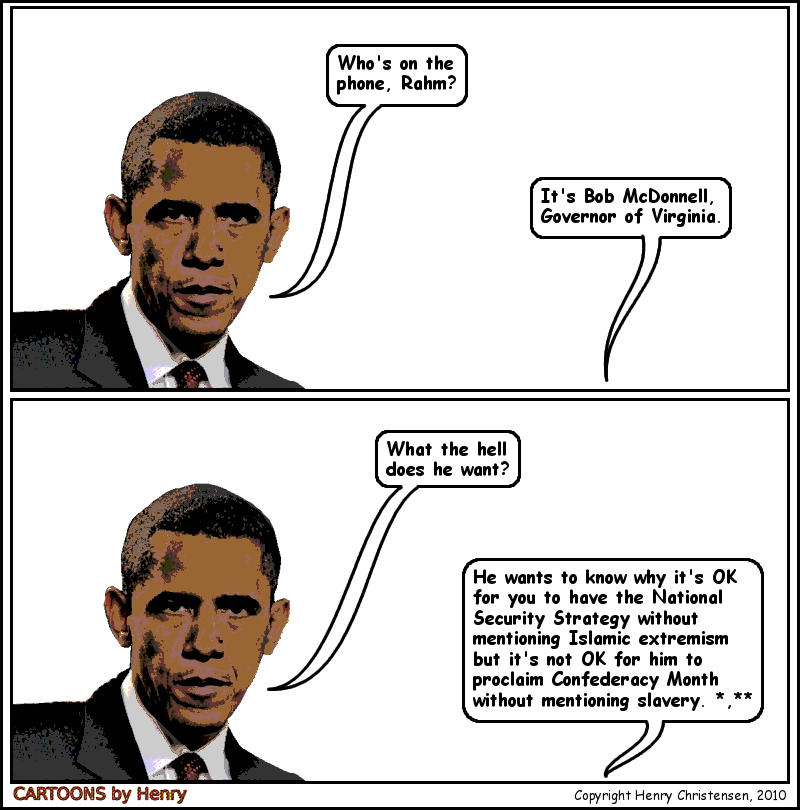The national security strategy that isn't
 Wednesday, June 9, 2010 at 12:07AM
Wednesday, June 9, 2010 at 12:07AM 
Reading the new National Security Strategy, one is struck by how little it actually talks about national security and instead speaks mostly about America's economic renewal (security assets listed include a strong economy, fiscal discipline and access to affordable healthcare).
All the right things are said about enlisting the aid of rising great powers, and everybody, including the FT, admires the calmer tone, but this document doesn't really clarify the war aims in Afghanistan--for example.
The NSS is often a list-drill, but this one is especially incoherent:
It also warns against imposing US values, yet says that building "government capacity" is essential. Or take domestic counter-terrorism. Rightly, the White House wants the issue kept in proportion--yet the strategy promises ever more resources for aviation security and intelligence gathering as though cost, disruption, and infringement of civil liberties were no object.
To me, the document sort of begs off on the question of US leadership, which is certainly a route for encouraging others to do more. But it signals an America that's adjusting, adjusting, adjusting--without much ambition for leading.
Again, maybe this is all we can expect with this administration, but it strikes me as largely a waiting strategy.











Reader Comments (4)
I think a grand strategy document must consider the economic health of the state, but using this document to talk about socialized medicine is silly. I agree with your assessment that the document falls short. Its stylistic problems are significant. For example, we should identify our state competitors (such as Iran and China) and non-state threats (Islamic extremism) in unambiguous terms. I'm not sure what obfuscation gets us.
Its problems with substance are even worse. The document fails to present a coherent, sustainable grand strategy that will preserve our liberty and security at home and economic interests abroad. This is further evidence that the strategy-making process in Washington is very broken. For example, the QDR should be released AFTER the NSS. The NSS is supposed to be the grand strategy document of the US. The QDR should examine how to operationalize the military piece of our grand strategy. Issuing a QDR before an NSS is putting the cart before the horse. I realize this isn't the first administration to do this, but this was the hope and change candidate, remember?
Trying to encourage burden-sharing is a good thing, because our resources are finite and our current strategic trajectory unsustainable over the long-term. This document, however, does not present a clear and sustainable path forward.
I was one of the guys that followed people, tapped their phones, took covert pictures of them and brought down the hammer when the time came. I have seen mistakes and screwups. I am very concerned about the invasion of privacy. I have heard people say "Well, if you have not done anything wrong, why should you worry?"
I believe that National Security begins with individual security. Individual liberty. The privacy of my home and my papers.
Beware the fear mongers. Beware the "We know best" attitude and the "You can trust us" statements. You can't trust a fool, and there are plenty of them in Washington.
But if you consider economic and military strength as mutually exclusive then I guess the NSS is right to highlight the necessity of an economic recovery.
An economic recovery for the US seems unlikely, without changing the rules of the global economy.
The NSS apparently wants to continue the old rules where the US ends up paying for many public goods, eg the UN system. Within this straitjacket Washington proposes more stimulus spending and sees prosperity in doubling the share of exports in the US economy from 10% in 2010 to 20% by 2020. But governments around the world also plan to increase their own exports at the expense of the US. Who'll win?
The rules need rethought at the G20.